EMG Technician On Long Island
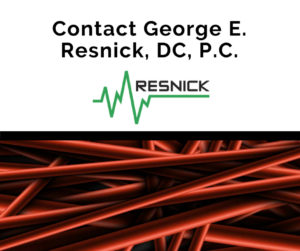 George E. Resnick, DC, P.C. specializes in administering mobile diagnostic services for doctors at their locations. Dr. Resnick is an experienced EMG technician on Long Island and by consulting and examining patients and providing electrodiagnostic techniques, we assist healthcare professionals in determining the most appropriate diagnoses, prognoses and treatment recommendations. Our company schedules and collaborates with practices in an expedient, ethical and productive manner.
George E. Resnick, DC, P.C. specializes in administering mobile diagnostic services for doctors at their locations. Dr. Resnick is an experienced EMG technician on Long Island and by consulting and examining patients and providing electrodiagnostic techniques, we assist healthcare professionals in determining the most appropriate diagnoses, prognoses and treatment recommendations. Our company schedules and collaborates with practices in an expedient, ethical and productive manner.
Many practices handle a variety of cases where functional diagnostics are medically necessary. Our professional services render significant benefits to patient management throughout the tri-state New York metropolitan area. In addition to being adept at handling prescriptions for Electromyography and Nerve Conduction Studies, we offer an extensive range of Neuro-diagnostic Testing and Examination Services.
George E. Resnick, DC, P.C. allows healthcare practitioners to offer patients advanced diagnostics with the quality, professional and comfortable experience all can be confident with. Attention to the details of each individual case is our utmost priority.
What other doctors are saying about Dr. Resnick and his work as an EMG technician on Long Island
Nunzio Saulle, MD (Brooklyn, NY) Diplomat American Board of Physical Medicine & Rehabilitation “Dr. Resnick’s electrodiagnostic study reports are clear, concise, and accurate. These reports aid us tremendously in the diagnosis and treatment of patients. Patients find these uncomfortable or unpleasant tests much less disturbing when performed by Dr. Resnick.”
Elizabeth Efthimiou, MD (Plainview, New York) Certified in Physical Medicine & Rehabilitation “I have come to know and trust Dr. Resnick and I have worked closely together on our mutual patient’s diagnostics and rehabilitation needs. His commitment to excellence academically and clinically is distinguished.”
Charles H. Bagley, M.D. (New York, New York) Board Certified in Neurology & Electrodiagnostics “Dr. George Resnick has performed electrophysiological testing in my offices in Great Neck, N.Y. and Manhattan. He is personal and very good with patients in applying tests, which are sometimes unpleasant.”
Marc J. Lamantia, DC, DACNB (Garden City South, NY) Board Certified Chiropractic Neurologist “Dr. Resnick has shown exemplary efforts in his pursuit of continued education and clinical experience. His many certifications in Neurology and Electrophysiology are a reflection of his professionalism and competence.”
Enrico Fazzini, DO (New York, NY), Board Certified Neurologist “I trust Dr. Resnick’s opinions with specific regard to his expertise in neuro-electrodiagnostics and his conservative based patient 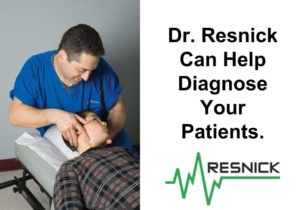 management recommendations. My patient’s have always reported to me a high level of professionalism and excellent bedside manner when consulting with Dr. Resnick. I take comfort in knowing Dr. Resnick is part of the diagnostic and treatment team within our practice.”
management recommendations. My patient’s have always reported to me a high level of professionalism and excellent bedside manner when consulting with Dr. Resnick. I take comfort in knowing Dr. Resnick is part of the diagnostic and treatment team within our practice.”
Robert Melillo, DC, DACNB (Ronkonkoma, New York) Board Certified Chiropractic Neurologist “Dr. Resnick presents professionally, friendly, and with a level of care and concern, which has made my patient’s very comfortable during procedures, which are inherently uncomfortable.”
Allan Weisberg, DC (New York, NY) Midtown Medical and Health Offices “I have never received so much positive feedback from my patients as I do in response to the sensitive caring and professional manner of Dr. Resnick. He is reliable and dependable, and he always stays on time with the patient’s schedule.”
Jill A. Bressler, MD (Syosset, New York) Board Certified Neurologist “In many of our mutual cases, I have grown to count on Dr. Resnick’s input and look forward to his point of view. His adept management of patient interactions creates an ease of comfort of all involved.”
What is Electromyography Testing from an EMG technician on Long Island
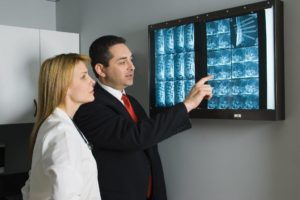 An electromyography (EMG) test is used as a diagnostic tool to assess the condition of muscles and their corresponding motor neurons. Many times these tests are useful in detecting nerve dysfunction and/or muscle disorders. At Resnick Electrodiagnostic Consultative Services, Dr. George Resnick is an experienced EMG technician on long island and provides EMG testing conveniently at your practice.
An electromyography (EMG) test is used as a diagnostic tool to assess the condition of muscles and their corresponding motor neurons. Many times these tests are useful in detecting nerve dysfunction and/or muscle disorders. At Resnick Electrodiagnostic Consultative Services, Dr. George Resnick is an experienced EMG technician on long island and provides EMG testing conveniently at your practice.
There are two separate tests often administered during an EMG procedure: a needle EMG and a nerve conduction velocity study (using electrodes), both are done by an EMG technician on long island. During the needle EMG, a needle electrode is placed into a muscle to test the nerve functionality. This can help you to determine if a patient is suffering from any of the following diseases:
- Carpal Tunnel Syndrome
- Pinched Nerve
- Neuropathy
- Muscular Dystrophy
- Sciatica
- Radiculopathy
- Myasthenia Gravis
- Amyotrophic Lateral Sclerosis
- Muscular Dystrophy
A nerve conduction velocity study can help determine if your patient has any of these conditions just like EMG, except provides further insight. The results convey activity in terms of strength and speed of neural signals. In most cases, damaged nerves will have lower speed and electrical impulse due to injury to the axiom or myelin sheath. NCV can differentiate between both injuries to provide the most precise diagnosis. Contact us here to arrange for EMG testing by an EMG technician on Long Island or New York City for you and your patients’ convenience.
What symptoms can indicate that an EMG test is needed?
If your patient is experiencing any of the following neuromuscular symptoms, they may benefit from an EMG test from an EMG technician on Long Island:
- Tingling
- Numbness
- Pain
- Cramping
Are there any risks involved in EMG testing?
The EMG test itself is relatively low-risk, especially when electrodes are the method used.
How much time is required for an EMG?
Plan to set aside anywhere from 30 to 60 minutes for your patient to receive an EMG test.
Finding Small Nerve Fiber Irregularities
Small nerve fiber irregularities can cause debilitating burning and shooting pain in the affected area(s) of the body, which can negatively impact your quality of life. The condition often begins in the lower extremities such as the feet and slowly ascends up the legs. In severe cases, it can affect the upper extremities including the hands. So, what causes small fiber neuropathy? Current research suggests that this condition develops from damaged myelinated and unmyelinated nerve fibers due to the existence of another comorbid condition such as HIV, diabetes, celiac disease, thyroid dysfunction, and other glucose dysregulation related disorders.
What are the symptoms of small nerve fiber irregularities?
- Pins-and-needles-like sensation in the feet
- Feeling like sand or a pebble is stuck in the shoe and cannot come out.
- Persistent burning pain
- Allodynia (a painful sensation from stimuli that do not usually cause pain).
- Hyperesthesia (an increase in sensitivity involving sight, touch, sound, and smell).
- Tingling
- Numbness
Symptoms arising from small nerve fiber irregularities of the autonomic nervous system and the digestive system include excessive sweating, nausea, vomiting, constipation, and dry eyes and/or mouth. Testing for Small nerve fiber irregularities is completed by an EMG technician on long island.
Electrodiagnostics?
Electrodiagnostics uses electrical and computer averaging technology to capture electrical signals and measure the size, speed, and timing of electrical impulses which travel along nerves and between nerves and muscles. The testing is used for diagnosing and locating nerve, neuromuscular junction, and muscle disease or injury. This test is able to provide focused treatment for the exact location of the injury. The two tests that I use include Electromyography and Nerve Conduction Velocity studies which are should always be run together which is done by an emg technician on long island.
How are they done?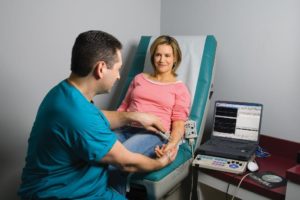
The nerve conduction velocity test consists of acquiring electrical recordings from pickup electrodes affixed to the skin along nerve pathways. Nerves are gently stimulated with a small amount of electric current by a hand-held surface probe at various sites across the nerves course in the limbs. Signals are captured with an amplification system, and calculations of response size, timing, and speed of conduction are measured. Signal deficits can be captured along the nerve pathways leading to a variety of specific diagnoses related to nerve, neuromuscular junction, and muscle transmission problems. An Electromyography or EMG test involves putting small, thin needles into the muscle to record the electrical activity or electrical noise the muscles make. An EMG technician on Long Island can read this test to determine muscle function. This testing helps localize pathway problems. Your patients may wish to look into our skilled EMG technician on Long Island if they have carpal tunnels syndrome, thoracic outlet syndrome, ulnar nerve entrapment, or cervical or lumbar radiculopathy.
Another popular test is the nerve conduction velocity study (NCS). NCS tests how fast electrical impulses travel from one point to another on a specific nerve pathway. NCS can be used for a multitude of diagnostic purposes. NCS help detects and locates damage to a nerve so that the proper treatment protocol can be discussed with a patient. Often, the results from an NCS are compared with those of an electromyography (EMG) test to determine if a patient has a muscle, neuromuscular junction or a nerve disorder. If you are looking for more information on an EMG technician on Long Island, contact us here.
Nerve Conduction Velocity Studies
How does an NCS work?
During an NCS, recording and stimulating electrodes are placed on the skin, through which electric impulses are generated and recorded. The size, timing, and speed of the impulse are recorded and interpreted by Dr. Resnick, a skilled EMG technician on Long Island, as they compared to normative data.
What are some of the conditions which NCS test for?
The following conditions can be tested for and possibly diagnosed with an NCS and EMG by our skilled EMG technician on Long Island:
- Entrapment neuropathies like Carpal tunnel syndrome
- Acquired neuropathies like Guillain-Barre syndrome
- Radiculopathies as seen in Herniated Disc disease
- Sciatic nerve-related issues
- Degree and severity of Various traumatically induced Nerve injuries
- Familial congenital neuropathies like Charcot-Marie-Tooth disease
What are some of the advantages of having an NCS?
Besides the possibility of ruling out or diagnosing a disease, locating and determining the extent, degree, and severity of a disease, NCS offer other benefits as well. No drugs or sedation are 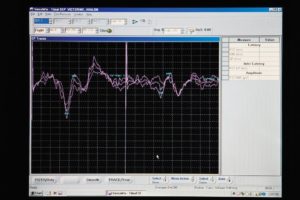 required for the test to be done, and it is done right in your office. In the case that you are looking for nerve conduction velocity studies, to be carried out by a skilled NCS and EMG technician on Long Island.
required for the test to be done, and it is done right in your office. In the case that you are looking for nerve conduction velocity studies, to be carried out by a skilled NCS and EMG technician on Long Island.
NCS are non-invasive and involve a minimal amount of discomfort. The test doesn’t require any downtime, so your patient may continue on with their daily activities the same day as the procedure. There are no downsides to NCS, as they do not halt or interfere with daily life.
Resnick Electrodiagnostic Consultative Services offers nerve conduction velocity studies on Long Island in a mobile setting for your diagnostic convenience. We also offer a host of other electrodiagnostic services including electromyography (EMG), electroencephalography (EEG), Intraoperative Monitoring (IOM) and more. All of our services can be provided by an EMG technician on Long Island, or in New York City. Contact us today!
Nerve Conduction Velocity
Are your patients experiencing numbness or tingling? Then you may want to recommend a nerve conduction velocity test. This test is used to diagnose neurological diseases or conditions such as carpal/tarsal tunnel syndrome, peripheral neuropathies, neuromuscular junction disorders and more. The test provides an accurate measurement of nerve function including size, timing, and speed of response which leads to the quantitative determination of the location and extent of any neurological damage or injury. At Resnick Electrodiagnostic Consultative Services, we can provide a variety of advanced mobile diagnostics right in your office, allowing you to better serve your patients. If you are looking for testing carried out by skilled a skilled NCS and EMG technician on Long Island, see how our services can help you today!
What your patients should expect?
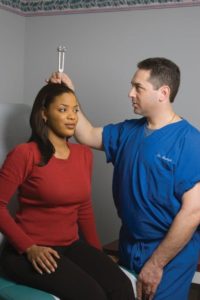 We want to make sure your patients are as comfortable as possible while experiencing quality, professional care. After careful evaluation and case discussion, we will administer diagnostic testing. Depending on the nature of the patient’s symptoms, we will place stimulating and recording electrodes at specified locations on the skin in standardized positions in order to stimulate and record sensory and motor nerve activity.
We want to make sure your patients are as comfortable as possible while experiencing quality, professional care. After careful evaluation and case discussion, we will administer diagnostic testing. Depending on the nature of the patient’s symptoms, we will place stimulating and recording electrodes at specified locations on the skin in standardized positions in order to stimulate and record sensory and motor nerve activity.
Mild, tolerable electrical stimulation on the skin surface over the nerve of interest is the reported sensation. The worst reported reaction is mild discomfort. Several nerves are studied based on the patient’s suspected condition after a clinical examination is employed. Test time varies based on presenting problems. Your patient’s comfort is our top priority throughout this entire process. Our skilled EMG technician on Long Island can make the process as comfortable and easy as possible for your patients.
In addition, a routine Needle Electromyographic examination (EMG), is typically administered at the same time as a nerve conduction velocity study. They are sister tests and are generally run in tandem when evaluating patients. An EMG performed by our EMG technician on Long Island can be used to determine if there are any issues with the electrical activity of the muscles. These abnormalities could be indicative of certain disorders related to main motor nerve axonopathies, myopathic disorders, and/or neuromuscular junctional disorders. The Needle EMG component of the procedure involves gentle insertion of a thin pin style needle electrode, into the muscles, one at a time, through the skin, so as to use the pin as a pick-up microphone within the muscles, so the electrical muscle noise can be heard. This test is completely safe and well tolerated when performed by our highly professional EMG technician on Long Island.
